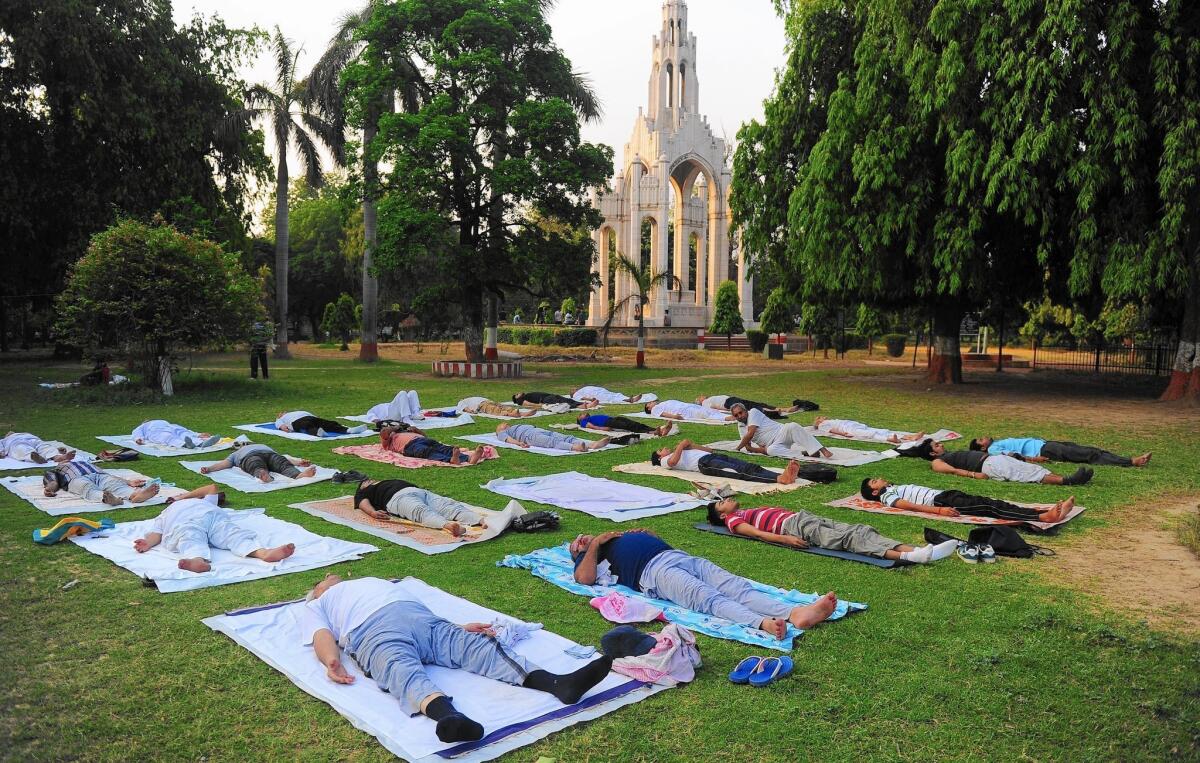India’s plans for Yoga Day taking a stressful turn

- Share via
Reporting from Mumbai, India — Chhatrapati Shivaji Terminus, the Victorian-era headquarters of one of India’s largest rail networks through which more than 600,000 passengers travel every day, is not known as a place of calm.
But in a chandeliered, colonnaded executive dining hall, a few dozen railway employees have been attending voluntary yoga classes every afternoon as part of a government-sponsored campaign to promote the ancient Indian discipline nationwide.
“It’s very peaceful,” R. Rajeshwari, a 26-year veteran of the commercial inspections department, said after an hourlong session Wednesday. “My job is mostly sitting at my desk or running around to stations. I’ve never had such a chance before.”
The organized breathing, chanting and stretching culminates Sunday in the first International Day of Yoga, an idea proposed at the United Nations General Assembly last fall by Prime Minister Narendra Modi, a yoga devotee, and endorsed by 175 countries.
India’s leadership of the event, however, has been rather less serene than some yoga teachers might like.
To ensure a good turnout, students in Mumbai have been told to come to school early Sunday morning for yoga demonstrations. Army personnel are expected to take part at bases and aboard aircraft carriers. Paunchy civil servants have huffed and grimaced through official practice sessions.
The Foreign Ministry has flown instructors around the world and is sponsoring yoga events in 191 countries through its diplomatic missions, officials said. Thousands are expected in New York’s Times Square, where yoga guru Sri Sri Ravi Shankar will take the crowd through poses that will be broadcast via satellite. Events are also planned in Los Angeles, San Francisco and other cities.
The biggest event will take place in New Delhi, the Indian capital, where about 35,000 people will participate in a 35-minute program at Rajpath, the ceremonial boulevard that more often hosts military parades and funeral processions. Modi will attend, although officials say he will not be practicing yoga.
Organizers have applied for consideration in the Guinness Book of World Records for the largest yoga demonstration and have recruited athletes, film stars and government officials to beef up the number. Senior bureaucrats were sent letters last week admonishing them to study the prescribed poses closely because if “their performance is not up to the mark, we run the risk of the record claim … being affected.”
In announcing the unusually thorough preparations, Foreign Minister Sushma Swaraj described yoga as “the best soft power India has.”
“The aim is to bring the world on the path of peace,” Swaraj said. “It is needed as we have been witnessing violence around us.”
Yet in a country increasingly polarized along religious lines, some see the promotion of yoga as part of a broader pro-Hindu agenda by Modi’s conservative government, which has ties to right-wing Hindu nationalist groups that are often hostile to religious minorities, particularly Muslims.
Over the last year, Modi allies have falsely accused Muslims of forcibly converting Hindus to Islam, attempted to make Hindu religious texts required reading in schools and banned the possession of beef in the western state of Maharashtra on grounds that the cow is sacred in Hinduism.
It was perhaps not surprising, then, that some prominent Muslim groups refused to participate in yoga demonstrations because of the discipline’s Hindu roots. They argued that the surya namaskar pose, or sun salute, violates the Islamic belief that only God can be worshiped, while some yogic chants are part of Hinduism.
“Chanting ‘Om, hari om’ — these are the words of Hinduism. Muslims cannot say these words,” said Abdul Rahim Qureshi, general secretary of the All India Muslim Personal Law Board. The group has filed a case against the government of the northern state of Rajasthan for reportedly requiring students to attend the yoga sessions.
“This government is trying to impose Hindu culture and Hindu forms of worship on non-Hindus,” Qureshi said. “This is not allowed by the constitution.”
Officials pointed out that the sun salute was not part of the official list of poses for Yoga Day. Some states said the demonstrations were not compulsory. It all amounted to a great deal of friction for an event that was supposed to promote harmony.
“Yoga has no religious connotation. People like to make political statements that are not based on facts,” said Subodh Tiwari, joint director of the Kaivalyadhama Yoga Institute, the main organizer of events in Mumbai.
But Tiwari acknowledged that Modi’s embrace of yoga had undoubtedly led to a reawakening of the discipline in India. With the support of state officials, his institute will be holding events Sunday for employees of the railways, postal service, utility companies, police and other agencies, as well as prisoners and the general public.
Railway officials in Mumbai first thought of offering yoga to their employees several years ago and described the voluntary classes that started last month as “in line with the government’s thinking.”
“Yoga has always been there in India, but it was taken for granted,” Tiwari said. “You have to be proud of something to promote it. [Modi] has taken something that was there in our heritage and strengthened it.”
Special correspondent Parth M.N. contributed to this report.
More to Read
Sign up for Essential California
The most important California stories and recommendations in your inbox every morning.
You may occasionally receive promotional content from the Los Angeles Times.













